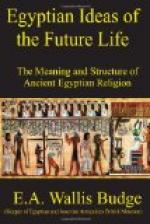Here it will be objected by those who declare that the ancient Egyptian idea of God is on a level with that evolved by peoples and tribes who stand comparatively little removed from very intelligent animals, that such high conceptions as self-existence and immortality belong to a people who are already on a high grade of development and civilization. This is precisely the case with the Egyptians when we first know them. As a matter of fact, we know nothing of their ideas of God before they developed sufficiently to build the monuments which we know they built, and before they possessed the religion, and civilization, and complex social system which their writings have revealed to us. In the remotest prehistoric times it is probable that their views about God and the future life were little better than those of the savage tribes, now living, with whom some have compared them. The primitive god was an essential feature of the family, and the fortunes of the god varied with the fortunes of the family; the god of the city in which a man lived was regarded as the ruler of the city, and the people of that city no more thought of neglecting to provide him with what they considered to be due to his rank and position than they thought of neglecting to supply their own wants. In fact the god of the city became the centre of the social fabric of that city, and every inhabitant thereof inherited automatically certain duties, the neglect of which brought stated pains and penalties upon him. The remarkable peculiarity of the Egyptian religion is that the primitive idea of the god of the city is always cropping up in it, and that is the reason why we find semi-savage ideas of God side by side with some of the most sublime conceptions, and it of course underlies all the legends of the gods wherein they possess all the attributes of men and women. The Egyptian in his semi-savage state was neither better nor worse than any other man in the same stage of civilization, but he stands easily first among the nations in his capacity for development, and in his ability for evolving conceptions concerning God and the future life, which are claimed as the peculiar product of the cultured nations of our time.
We must now, however, see how the word for God, neter, is employed in religious texts and in works which contain moral precepts. In the text of Unas, [Footnote: Ed Maspero, Pyramides de Saqqarah; p. 25.] a king who reigned about B.C. 3300, we find the passage:—“That which is sent by thy ka cometh to thee, that which is sent by thy father cometh to thee, that which is sent by R[=a] cometh to thee, and it arriveth in the train of thy R[=a]. Thou art pure, thy bones are the gods and the goddesses of heaven, thou existest at the side of God, thou art unfastened, thou comest forth towards thy soul, for every evil word (or thing) which hath been written in the name of Unas hath been done away.” And, again, in the text of Teta, [Footnote: Ibid., p. 113.] in the




